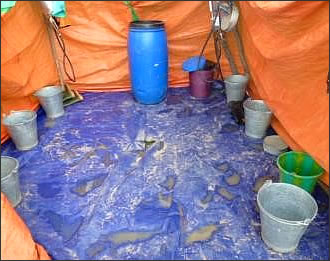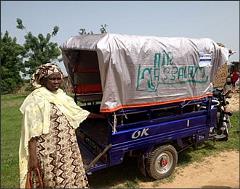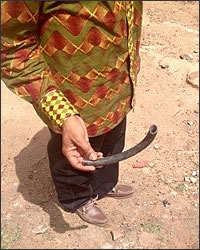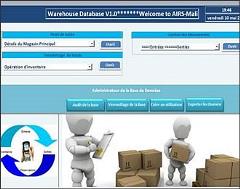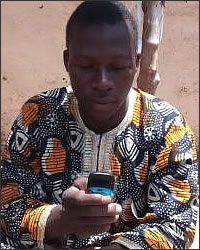Mobile Soak Pits
In 2014, PMI piloted the use of mobile soak pits in remote areas around Mali to increase efficiency and improve environmental safety. In the 2015 IRS campaign, mobile soak pits have enabled spray operators to clean up immediately after completion of daily spraying, rather than having to travel with insecticides to a central location for disposal and washing. This not only limits the spray operators’ exposure to insecticide, but also provides operational flexibility and reduces construction and labor costs.
Renting “Taxini” services (motorbikes with connected carts) in Mali has reduced both fuel and vehicle rental costs for the 2015 IRS campaign. Instead of renting minibuses, pick-up trucks, and other large vehicles, the Taxini service can transport up to 10 people and provides significant cost savings for the country program. Mali plans to replace 22 vehicles with rented Taxinis for the 2015 IRS campaign, translating in approximate savings of US$33,500.
In-Country Insecticide Recycling
After IRS campaigns, depending on the type of waste that is generated, the remaining product is incinerated, landfilled, or recycled. In Mali, PMI’s Environmental Compliance Officer and a representative of the Environmental Ministry have identified a local company that is recycling the left over pesticide bottles into overhead power line conductor material. This recycling effort not only supports local business, but also reduces the costs associated with the disposal and transport of empty bottles across country borders.
Electronic Inventory Management System
Mali’s IRS program is leading the way in “real time” inventory record keeping through the use of an electronic inventory management system, which was established in two district warehouses in 2013. Storekeepers at IRS operation sites text on the mobile phones “real time” information on inventory stock levels to district warehouse storekeepers. This information is then updated in the central system. This electronic inventory tracking system not only saves time, reduces errors, and keeps records up-to-date, but also it benefits IRS campaigns by positioning storekeepers to navigate unexpected changes in stock quickly.
SMS Payment of Seasonal Field Staff
In partnership with Orange and Ecobank’s mobile money transfer service, PMI has set up payment of seasonal spray operator staff in the field through money transfers over a mobile phone device. This method of payment has proven effective and reduces security risks related to staff having to transport large amounts of money to the field to pay employees. In addition, the convenience and ease of use of the mobile technology service not only introduces spray operators to basic financial services, but also enhances economic activity and growth for the country. With plans to be rolled out in several other African countries within the next year, this mobile money transfer service has the potential for implementation in other countries where PMI supports IRS activities.

